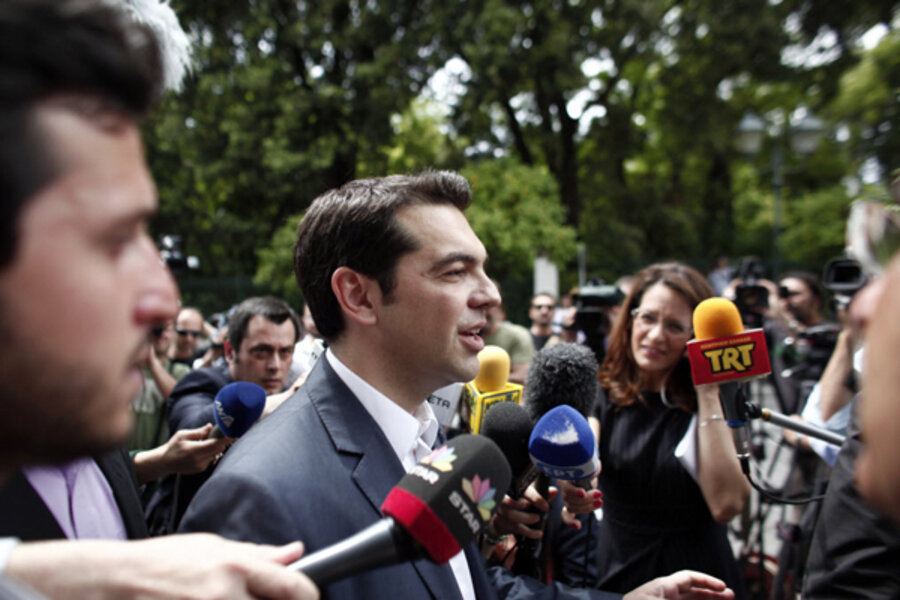Greek impasse deepens as talks fail
Loading...
A second round of talks to form a coalition government collapsed Wednesday, with Greece's future in the euro and commitment to its international bailout deal in the balance and the specter of new elections looming ever larger.
Sunday's election threw the country's political scene into turmoil after voters angered by years of Europe's harshest austerity program — implemented to secure vital international bailouts and fend off bankruptcy — hammered mainstream politicians, but left no party with enough seats in Parliament to govern alone.
Alexis Tsipras, head of the runner-up Radical Left Coalition, or Syriza, met with heads of parties across the political spectrum as he tried and failed to win support for Greece's first left-wing-led government in four decades of democratic rule.
"We saw that our proposal enjoys broad social support, but weak parliamentary backing," Tsipras, 38, told a meeting of party lawmakers. "We can't make our dream come true, and form a left-wing government."
Tsipras' insistence that a new government denounce the bailout deal with the International Monetary Fund and other European countries provoked a backlash from the other two main parties, who argued the move would see Greece leave the common European currency and endure years of poverty and isolation.
The political uncertainty has alarmed Greece's international creditors, who have insisted the country must stick to the cost-cutting terms of its bailout.
Athens has promised to pass new austerity measures worth €14.5 billion ($18.9 billion) next month and to implement other reforms. These will be reviewed by its creditors, who will then determine whether to continue releasing rescue loans that are keeping Greece solvent.
The eurozone's bailout fund, the European Financial Stability Facility, approved the release of a €5.2 billion ($6.73 billion) batch in rescue loans Wednesday. Greece will receive €4.2 billion ($5.44 billion) of that Thursday, while another €1 billion ($1.3 billion) is expected in June depending on Athens' needs.
German Chancellor Angela Merkel stressed she still wants to keep Greece in the eurozone.
"I have always wanted to solve (the debt crisis) in such a way that Greece remains a member of the eurozone. Nothing about that has changed," she was quoted as saying in an interview with the daily Passauer Neue Presse.
Merkel has been a leading advocate of austerity as a cure for Europe's debt troubles, but that course has become hugely unpopular in Greece — and Sunday's election has generated new political instability.
Merkel insisted Greece must stick to its agreements with creditors and its reform course.
"Only this way can we imagine Greece's road back to stability and economic strength," she said.
In Athens, the efforts for stability and economic strength struck a road bump.
Conservative New Democracy leader Antonis Samaras, who won the elections with a meager 18.85 percent and 108 seats in the 300-member parliament, said it was impossible for him to agree to the demands laid down by Tsipras.
"I explained to Mr. Tsipras that the conditions he set do not lead to a renegotiating of the bailout policy, but to a unilateral denunciation of it and to the country's immediate bankruptcy," Samaras said.
"By repudiating the agreement, Mr. Tsipras is asking for something ... that will isolate Greece. He's not asking me to withdraw my signature. He's asking me to accept Greece's exit from the euro and the country's bankruptcy. I will not do that."
Given that the Communist Party refuses to join any government and no parties are talking to the extreme right Golden Dawn, which won 21 seats, no majority coalition can be formed without Samaras.
Samaras said he was prepared to back a minority government that his party would not participate in, on condition that the country stays in the eurozone.
"The Greek people voted for two things: to remain in the euro and for a change of policy," he said.
The conservative leader gave up the task of trying to form a government a few hours after receiving the mandate on Monday. Next in line is former finance minister and socialist PASOK party leader Evangelos Venizelos, who takes over on Thursday.
PASOK, which has dominated Greek politics along with the rival conservatives for four decades, came a humiliating third in Sunday's elections, with 13.18 percent — its lowest since 1974 when it was formed after the fall of a seven-year dictatorship. It has just 41 seats — a quarter of its pre-bailout strength
Venizelos said he will continue negotiations Thursday, despite the lack of agreement in meetings the past few days.
"It was clear that in the current stage of this process we cannot reach a solution but that we must continue this effort," he said. "So the mandate I will receive tomorrow will have substance and importance."
If no solution can be found, the country's president will convene all leaders in a last-ditch attempt to cobble together a government. If that fails, Greece will head to new elections in early June.
Both Samaras and Venizelos, as well as Fotis Kouvelis, the head of the smaller Democratic Left party which holds 19 seats and is a potential kingmaker, insist everything must be done for Greece to remain part of Europe's common currency.
"The vast majority of the country wishes to remain in the euro," Venizelos said. "An exit from the euro would result in mass poverty, a loss of value of property, income and prospects. Greece would lose many decades."







